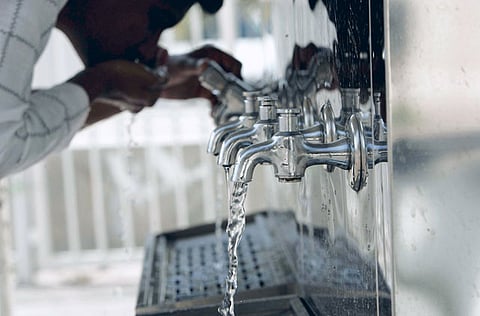Abu Dhabi targets zero water wastage in 1 year
Recycling efforts receive top priority under integrated management plan

Abu Dhabi: Amid warnings that available fresh and brackish water reserves in Abu Dhabi will not last 50 years, a scheme is under way to treat and reuse all wastewater across the emirate within a year, an official said yesterday.
“All wastewater resources in Abu Dhabi will be treated and reused as part of plans to enhance integrated water management,” Dr Mohammad Dawood, a senior expert on water resources at the Environment Agency-Abu Dhabi (EAD) told Gulf News.
Dawood added that improving the efficiency of water use, and reducing waste and losses in distribution systems are the most affordable ways to address the problem of water scarcity, but improved wastewater treatment technologies and wastewater reuse are becoming essential amid growing public concern for the environment.
At present, 45 per cent of wastewater is either discharged back into the sea or into the desert, according to EAD’s estimates.
Dr Dawood estimated that treated sewage water contributed 7.2 per cent of the water supply in the emirate. “In Abu Dhabi, groundwater is a non-renewable resource, while at present there are three sources of water in the emirate: groundwater which accounted for about 63.6 per cent, desalinated water accounts for about 29.2 per cent, and treated sewage water represents about 7.2 per cent of the total water resources used.”
He was speaking on the sidelines of a panel discussion on ‘The status of groundwater in Abu Dhabi’, organised by EAD in collaboration with the Emirate Centre for Strategic Studies and Research to raise awareness about groundwater as a national strategic resource that should be managed and protected for future generations.
“Water resources are used in different development sectors; the agricultural sector takes 57.98 per cent of the total consumed water, urban sector [domestic] 9.75 per cent, and the forest sector 11.73 per cent, and the gardens and parks 13.38 per cent, in addition to industrial and commercial uses at 7.16 per cent,” Dr Dawood said.
The EAD has led several long-term initiatives in partnership with other government entities to address the groundwater problem and work towards the sustainability of this strategic resource, he said. These initiatives include the management and monitoring of groundwater in the emirate, the development of a strategy to promote the use of recycled water, the enforcement of Law No (6) for the year 2006 which regulates the drilling of groundwater wells, the construction of a groundwater aquifer in Liwa and Shweib and the rolling out of awareness initiatives targeting farm and land owners”.
Five specialists participated in the discussion which was moderated by Monir Bu Ganem, EAD’s Director of Environment Policy and Planning Division.
Dr Mohamad Al Madfaei, executive director of EAD’s Integrated Environment Policy and Planning Sector, said groundwater conservation is a strategic priority for the Environment Agency-Abu Dhabi. “As the government authority mandated with environmental regulation, policy advice and protection, EAD has consolidated its efforts to respond with a set of initiatives to address this strategic dwindling resource. To achieve this goal, we work very closely with our partners and, in particular, with the agricultural sector, to prioritise where and how we allocate water and to be efficient with every drop,” he said.
Ali Al Marzouqi, director at the planning development division at Abu Dhabi Farmers’ Services Centre (ADFSC), said the role of the farmers’ centre focuses on minimising the environmental impact of agriculture and reducing water use in agriculture, besides increasing the contribution of agriculture sector in enhancing food security.
He also said that “the centre is focusing on increasing farming productivity and contributing to national food security and sustainable agriculture, improving irrigation efficiency in order to reduce water consumption in Abu Dhabi’s farms by 40 per cent. The centre also promotes new types of crops and cultivation of innovative patterns that improve water use efficiency and resistance to salinity and water scarcity.
Dr Ala’a Juma, agricultural adviser at the Abu Dhabi Food Control Authority (ADFCA), spoke about the role of ADFCA in maintaining the groundwater reserves in the emirate through the rationalisation of consumption and control of wastage and their implications for water and food security in the emirate.
Dr Khalil Ahmad Ammar, water resources management scientist at the International Centre for Biosaline Agriculture (ICBA), put forward a number of recommendations. Among the recommendations is a call for integrated planning of water resources in the emirate and for shaping a water policy and clear management of water resources in order to achieve sustainability.



